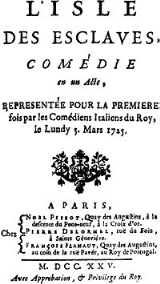
L'Île des esclaves
Encyclopedia
L’Île des esclaves is a one act comedy
by Pierre de Marivaux
. It was presented for the first time on March 5, 1725 at the Hôtel de Bourgogne
by the Comédie Italienne.
The play is characterized by a mixing of genres: Greek characters, a shipwreck leaning towards tragedy
, and social commentary. However, the play is essentially a comedy with its confusion of sentiments, exchange of power between masters and valets, and finally the appearance of Arlequin.
Both Arlequin and Cléanthis take advantage of the situation to expose the frivolities and fickleness of their masters. However, Arlequin is ultimately touched by the tears of Euphrosine, who is suffering from humiliation at the hands of Cléanthis. Arlequin and Iphicrate make amends and return to their original roles; Euphrosine and Cléanthis do the same.
Trivelin reveals that had Arlequin and Cléanthis not pardonned their masters, that they would have been punished.
Comedy
Comedy , as a popular meaning, is any humorous discourse or work generally intended to amuse by creating laughter, especially in television, film, and stand-up comedy. This must be carefully distinguished from its academic definition, namely the comic theatre, whose Western origins are found in...
by Pierre de Marivaux
Pierre de Marivaux
Pierre Carlet de Chamblain de Marivaux , commonly referred to as Marivaux, was a French novelist and dramatist....
. It was presented for the first time on March 5, 1725 at the Hôtel de Bourgogne
Hôtel de Bourgogne
Until the 16th century, the Hôtel de Bourgogne was the name of the Paris residence of the Dukes of Burgundy. Today, the last vestige is the Tour Jean sans Peur, 20 rue Étienne Marcel, in the 2nd arrondissement.-Theatre:...
by the Comédie Italienne.
The play is characterized by a mixing of genres: Greek characters, a shipwreck leaning towards tragedy
Tragedy
Tragedy is a form of art based on human suffering that offers its audience pleasure. While most cultures have developed forms that provoke this paradoxical response, tragedy refers to a specific tradition of drama that has played a unique and important role historically in the self-definition of...
, and social commentary. However, the play is essentially a comedy with its confusion of sentiments, exchange of power between masters and valets, and finally the appearance of Arlequin.
Plot summary
Iphicrate and his slave Arlequin find themselves shipwrecked on Slave Island, a place where masters become slaves and slaves become masters. Trivelin, the governor of the island, makes Arlequin and Iphicrate, as well as Euphrosine and her slave Cléanthis, change roles, clothes, and names.Both Arlequin and Cléanthis take advantage of the situation to expose the frivolities and fickleness of their masters. However, Arlequin is ultimately touched by the tears of Euphrosine, who is suffering from humiliation at the hands of Cléanthis. Arlequin and Iphicrate make amends and return to their original roles; Euphrosine and Cléanthis do the same.
Trivelin reveals that had Arlequin and Cléanthis not pardonned their masters, that they would have been punished.
Characters
- Iphicrate, an Athenian general.
- Arlequin, his slave.
- Euphrosine, an Athenian noblewoman.
- Cléanthis, her slave.
- Trivelin, the master of the island.
- Inhabitants of the island

